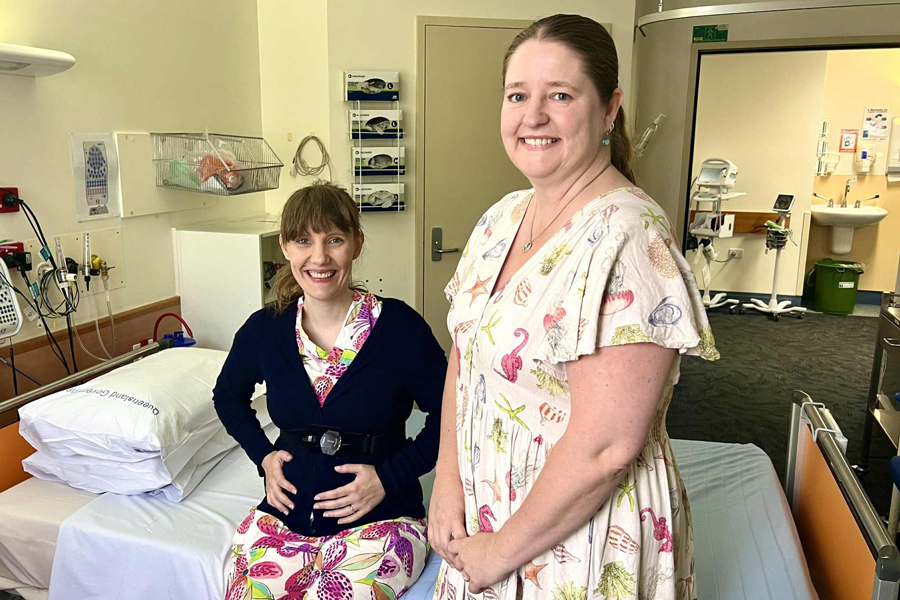New research highlights importance of balancing mental health with pregnancy advice

Pregnant women pictured with TPCH Sleep Disorders Centre Scientist and Research Officer Danielle Wilson.
New research examines whether advice for pregnant women to sleep on their sides is causing anxiety
New research at Redcliffe Hospital has highlighted the importance of balancing important sleep advice for pregnant women with their mental health.
The study, titled “Sleep on side: Awareness and anxiety around sleeping positions during late pregnancy”, assessed women’s knowledge of side sleeping recommendations in pregnancy, and explore feelings of anxiety in relation to this advice and how this may impact sleep.
The Sleep on Side policy, as part of the Safer Baby Bundle, was recently introduced in Australian antenatal clinics to reduce the risk of late stillbirth associated with women sleeping on their backs during pregnancy.
Research shows that pregnant women who report going-to-sleep on their back after 28 weeks gestation are 2.6 times more likely to experience stillbirth, possibly due to the compression of a major blood vessel, the inferior vena cava, decreasing blood flow and oxygen supply to the baby.
Funded by a Collaborative Research Grant from Metro North Health and The University of Queensland, the study surveyed 80 pregnant women. The Redcliffe Hospital study was conducted in collaboration with The Prince Charles Hospital (TPCH), the Royal Brisbane and Women’s Hospital and the University of Queensland.
It found that 95% of participants had received the advice to sleep on their side during pregnancy, with 81.6% of participants reporting “some” level of anxiety in relation to the recommendations and 1 in 10 reporting the advice makes them “very much” anxious.
Surprisingly, the women who reported feeling anxious about the advice did not report experiencing any impact on their sleep quality.
TPCH Sleep Disorders Centre Scientist and Research Officer Danielle Wilson said she has long been interested in how sleep can change during pregnancy, and how increased incidences of sleep disorders during pregnancy may impact overall maternal and fetal health.
“It was reassuring to know that almost all of the participants knew about the “Sleep on Side” policy and the reasons behind it, and many were actively making an effort to modify their sleeping position if needed,” Danielle said.
“Sleep is a large part of everyone’s lives and is so important during pregnancy, but it may be neglected among the numerous other things to worry about. For clinicians, it’s important to check in with women about their sleep and reassure them that they are doing the best they can.”
Study participant Sarah Johnson said taking part in the research was a great opportunity to learn more about side sleeping during pregnancy.
“I was aware that is wasn’t good to sleep on your back during the later stages of pregnancy, but I really didn’t understand why,” said Sarah.
“During my pregnancy, I did feel nervous about accidentally rolling onto my back while asleep, and even took a trip to the hospital at one point for peace of mind after waking up on my back.
“I was thrilled to be part of the study to contribute to this important work.”
